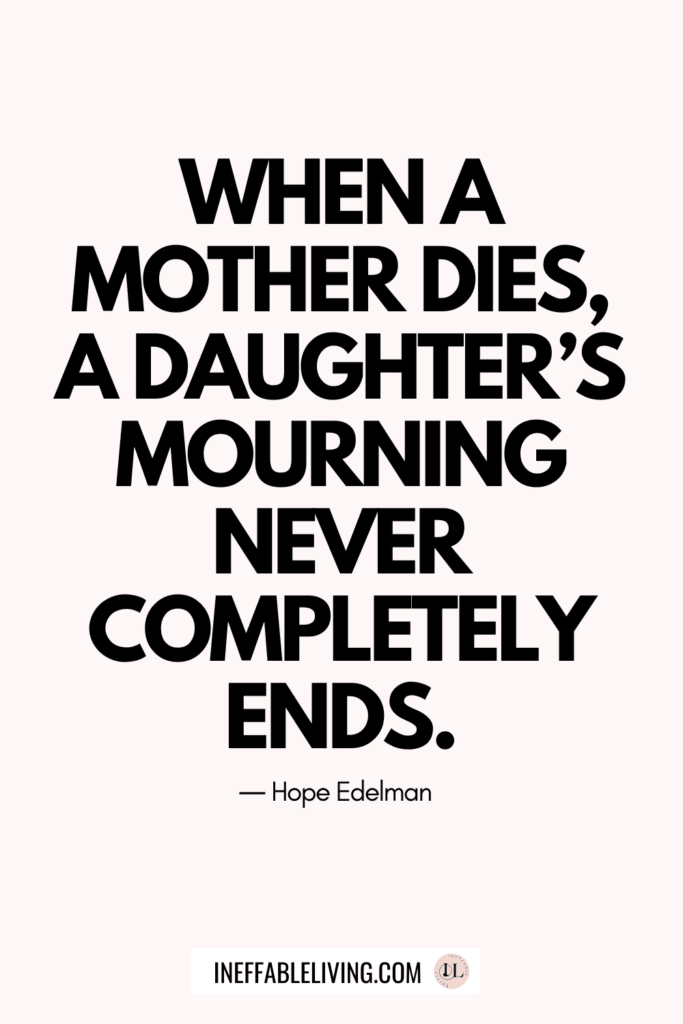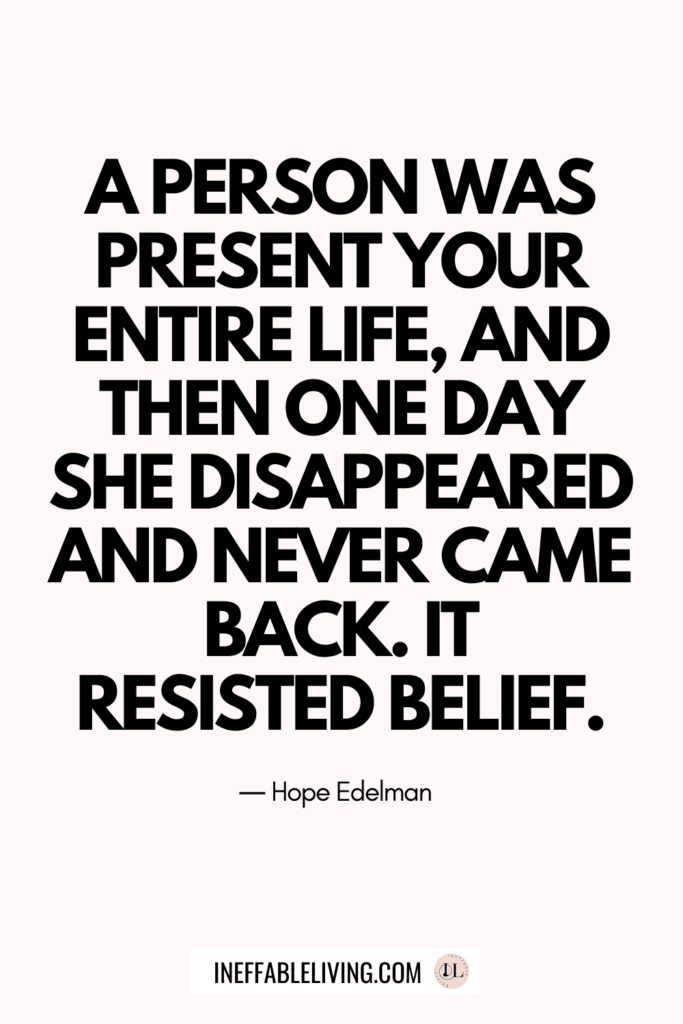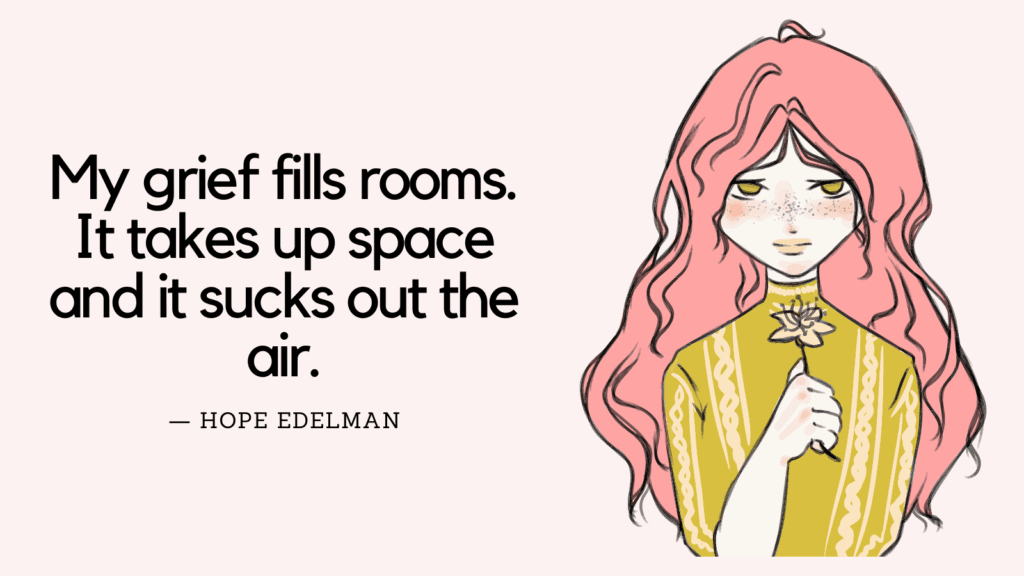This post contains some of the best motherless daughters quotes to help you feel less alone in your grief.
Motherless Daughters Quotes
1. “A mother’s death also means the loss of the consistent, supportive family system that once supplied her with a secure home base, she then has to develop her self-confidence and self-esteem through alternate means. Without a mother or mother-figure to guide her, a daughter also has to piece together a female self-image of her own.” ― Hope Edelman
2. “A person was present your entire life, and then one day she disappeared and never came back. It resisted belief.” ― Hope Edelman
Related: Best 21 Grief Journaling Prompts (+FREE Grief Worksheets PDF)
3. “Even though we knew she was going to die eventually, when it happened it was still a terrible, rude shock. I thought I was prepared, but when it happened I fell apart. That’s when I realized I’d been hanging on to the hope, however slim, that as long as she was alive she might somehow get better.” ― Hope Edelman
4. “Grief needs an outlet. Creativity offers one. Some psychiatrists see mourning and creativity as the perfect marriage, the thought processes of one neatly complementing the other. A child’s contradictory impulses to both acknowledge and deny a parent’s death represents precisely the type of rich ambiguity that inspires artistic expression.” ― Hope Edelman
5. “How much of my life my mother’s death would affect. And with the certainty of thirty-three years, I would tell her: everything. It affects everything. When a mother dies, a daughter grieves. And then her life moves on. She does, thankfully, feel happiness again. But the missing her, the wanting her, the wishing she were still here—I will not lie to you, although you probably already know. That part never ends.” ― Hope Edelman
6. “I do know that mother loss can be heartbreaking at any age. No matter how old we are, we yearn for a mother’s love throughout our lives, reaching for the security and comfort we believe only she can provide at times of illness, transition, or stress.” ― Hope Edelman
7. “I knew without doubt that my mother’s death had irrevocably altered who I was and who I would become. When a parent dies young, explains Maxine Harris, PhD, in The Loss That Is Forever, children have a personal encounter with death that influences the way they see the world for the rest of their lives. “Some events are so big and so powerful that they cannot help but change everything they touch,” she writes. How could all my thoughts and feelings, then, not be traced back to the event that had created such a jagged fault line through my history, dividing it into a permanent Before and After?” ― Hope Edelman
Related: Best +30 Grief Activities For Adults (+FREE Worksheets PDF)

8. “I miss her when I can’t remember what works best on insect bites, and when nobody else cares how rude the receptionist at the doctor’s office was to me. Whether she actually would have flown in to act as baby nurse or mailed me cotton balls and calamine lotion if she were alive isn’t really the issue. It’s the fact that I can’t ask her for these things that makes me miss her all over again.” ― Hope Edelman
9. “I needed someone to tell me it was all right to feel the anger and despair, but I received only kudos for my synthetically mature, responsible behavior.” ― Hope Edelman
10. “I truly believe that the death of my mother has made me the way I am today. I am a survivor, mentally strong, determined, strong-willed, self-reliant, and independent. I also keep most of my pain, anger and feelings inside. I refuse to be vulnerable to anyone, especially my husband. The only people who see that more emotional or softer side are my children. That too because of my mother.” ― Hope Edelman
11. “If I had to pinpoint my mother’s location, I’d say she’s nowhere and everywhere at the same time. She’s a foggy memory I can’t quite bring into focus and a gentle spirit that infuses all my days. She hovers in the background of my life now, suspended, shapeless, like familiar air.” ― Hope Edelman
12. “It’s impossible to undo fifteen or twenty years of learned behavior with a mother in only a few months. If it takes nine months to bring a life into this world, what makes us think we can let go of someone in less?” ― Hope Edelman
13. “My grief fills rooms. It takes up space and it sucks out the air. It leaves no room for anyone else. Grief and I are left alone a lot. We smoke cigarettes and we cry. We stare out the window at the Chrysler Building twinkling in the distance, and we trudge through the cavernous rooms of the apartment like miners aimlessly searching for a way out . . . Grief is possessive and doesn’t let me go anywhere without it. I drag my grief out to restaurants and bars, where we sit together sullenly in the corner, watching everyone carry on around us. I take grief shopping with me, and we troll up and down the aisles of the supermarket, both of us too empty to buy much. Grief takes showers with me, our tears mingling with the soapy water, and grief sleeps next to me, its warm embrace like a sedative keeping me under for long, unnecessary hours. Grief is a force and I am swept up in it.” ― Hope Edelman
Related: Grief Comes In Waves: Top 12 Lessons From Grief No One Talks About
14. “She loses not only her mother but also the encouragement and revalidation of the self she needs as well as the real sharing she would want to do with her mother at that time.” It” ― Hope Edelman
15. “Someone did us all a grave injustice by implying that mourning has a distinct beginning, middle, and end.” ― Hope Edelman
16. “Sometimes I wonder what losing my mother would have been like if I’d spent just a few more years with her, or if I’d known her for a few less.” ― Hope Edelman
17. “The degree to which a surviving parent copes is the most important indicator of the child’s long-term adaptation. Kids whose surviving parents are unable to function effectively in the parenting role show more anxiety and depression, as well as sleep and health problems, than those whose parents have a strong support network and solid inner resources to rely on.” ― Hope Edelman
18. “There is an emptiness inside of me — a void that will never be filled. No one in your life will ever love you as your mother does. There is no love as pure, unconditional and strong as a mother’s love. And I will never be loved that way again.” ― Hope Edelman
19. “There’s no good way to lose a loved one—just, in the words of one twenty-six-year-old woman, “different kinds of hell.” ― Hope Edelman
20. “We noticed that kids tend to start dealing with the loss six to nine months after the actual death, when the surviving parent is beginning to cope better. They need the safety and psychological security to be able to feel that intense distress. Surviving parents have to be picking up the pieces of their lives and running things relatively comfortably before kids can let down their hair and feel safe enough to grieve. Sometimes the surviving parent takes a year before he’s doing better, and then the child won’t begin grieving and having intense reactions until a year and a half after the loss.” It’s difficult for children to move beyond a surviving parent’s place of progress in the mourning process. If a parent gets stuck in a particular stage, chances are” ― Hope Edelman
21. “When a daughter loses a mother, she learns early that human relationships are temporary, that terminations are beyond her control, and her feelings of basic trust and security are shattered. The result? A sense of inner fragility and overriding vulnerability. She discovers she’s not immune to unfortunate events, and the fear of subsequent similar losses may become a defining characteristic of her personality.” ― Hope Edelman
22. “When a daughter loses a mother, the intervals between grief responses lengthen over time, but her longing never disappears. It always hovers at the edge of her awareness, prepared to surface at any time, in any place, in the least expected ways.” ― Hope Edelman
23. “When a mother dies too young, something inside her daughter always feels incomplete. There’s a missing piece she continues to look for, an emptiness she keeps trying to fill. The” ― Hope Edelman
Related: Resilient Grieving: Best 17 Ways To Manage Grief In The Workplace (+FREE Grief Worksheets)
24. “When a mother dies, a daughter grieves. And then her life moves on. She does, thankfully, feel happiness again. But the missing her, the wanting her, the wishing she were still here—I will not lie to you, although you probably already know. That part never ends.” ― Hope Edelman
25. “When a mother dies, a daughter’s mourning never completely ends.” ― Hope Edelman
26. “When my mother died, a lot of people tried to comfort me by saying, ‘Well, you still have your father. You still have a brother and sister. You have a wonderful husband and beautiful children.’ And you know what? That’s all true. That’s all completely true. But I still don’t have my mother.” ― Hope Edelman

27. “When one parent dies, the world is dramatically altered, absolutely, but you still have another one left. When that second parent dies, it’s the loss of all ties, and where does that leave you? You lose your history, your sense of connection to the past. You also lose the final buffer between you and death. Even if you’re an adult, it’s weird to be orphaned.” ― Hope Edelman
28. “Whether she actually would have flown in to act as baby nurse or mailed me cotton balls and calamine lotion if she were alive isn’t really the issue. It’s the fact that I can’t ask her for these things that makes me miss her all over again.” ― Hope Edelman
29. “Women need to recognize that in times of great stress, such extreme thoughts are normal,” she says. “It’s a very human impulse to want to live your life in a happy, healthy, productive way, and it’s a terribly stressful experience to watch someone you love in pain and know she’s not enjoying life herself.” ― Hope Edelman
30. “When we wish a loved one would die not only so that she’s out of her pain but also because we want our lives to continue as normally as possible, it’s neither good nor bad. It’s simply human.” ― Hope Edelman
Related: Grieving Someone Who Is Still Alive – Ambiguous Grief
31. “Surviving your motherless world is not something you can take day by day, or hour by hour. It is smaller, way more minuscule than that. It’s like the world’s smallest baby taking the tiniest baby steps imaginable. You get through it breath by painful breath. It’s literally that slow, that incremental. It feels like nothing is changing—until suddenly it is.”– Kate Spencer
32. “Life goes on after your mom dies. Not eventually. Like, the same day. One minute you are watching as paramedics lug your mother’s body out of her bedroom in a black body bag, blowing tears out of your nose and snot out of your eyes. Then, an hour later, you are bent over outside in your now-dead mom’s bright orange winter coat (the one she’d wear on purpose to your soccer games because she knew you hated it), your fingers freezing as they press against the inside of a plastic bag, prying dog crap off of the frozen ground. Dogs still have to go to the bathroom after people die, and while animals are intuitive, they’re not smart enough to sense that they should hold it in for a few years while you take the world’s longest, tear-filled shower.”– Kate Spencer
33. “It’s hard enough that the Worst Thing in the World just happened and you still have to brush your teeth, put on clothes, and try to eat. But someone also has to tell everyone in the world that she’s gone. That someone is you, and boy, nothing rubs salt in the Dead Mom Wound like having to tell people over and over again that she’s dead.”– Kate Spencer
34. “This is the hard truth about delivering Dead Mom News. You lie to people. A lot. It’s for their own good, of course; you don’t want them to worry, or to even for a second imagine your mom zombied-out in a morphine coma, her sallow skin hanging off her cheekbones. You drop the “died peacefully” line so they can form their own version of how it went, imagining her propped up on pillows, sleeping soundly until her eyes fluttered one last time and she drifted off into Happy Death Land. They never know that the week before it happened you had to roll your mom— the woman who birthed you, held you, called on every birthday—on her side to try to shove an enema in her ass. You leave out how—just days before her death—you rubbed her back for hours, until your arms ached, in a futile, desperate attempt to alleviate her pain.”– Kate Spencer
35. “Just when you think you’ve mastered the fine art of breaking the news about your dead mom, and told every person imaginable about it, a twist emerges, and suddenly your work is far from over. You see, now that you’ve transitioned into the “Everyone Knows” phase, you stumble upon people who want to talk about it. A lot. They exist in the most innocuous of places—at a party in line for the bathroom or standing in front of the dessert tray at a work luncheon. One minute you’re innocently crossing your legs to hold in your pee, or loading four brownies onto a paper plate the size of a dime, and the next minute your arm is being stroked by someone you barely know, tenderly gazing into your eyes and asking, “So your mom died of [insert shitty mom-killer here]?””– Kate Spencer
36. “Anyone who’s had the topic of their dead mom forced on them can attest: it can ruin your whole night and send you for a ride on your own personal crazy train. One second you’re minding your own business, and then suddenly you’re a pawn in someone else’s Learning How to Process Grief game. But there’s a fine line to walk here, between protecting yourself from soul-sucking conversations and possibly blocking yourself off from a connection that might actually help you.”– Kate Spencer
37. “Of all the holidays you have to endure as a motherless human, Mother’s Day is the pinnacle. The worst. The Darth Vader of holidays. So of course the first holiday I’d have to tackle without her would be Mother’s Day. Contrary to what people say, the universe does not have a sense of humor.”– Kate Spencer
38. “What I’ve learned is this: there is no getting around Mother’s Day. Every year its looming arrival causes an emotional explosion. One day in early April, I’m minding my own business, buying some cheese for my book club, when suddenly an email pops up on my phone. Crate and Barrel has “fresh gift ideas for mom!” And there I am, standing in line at Trader Joe’s, spiraling. No matter what I do—I set up ad-blockers to avoid the endless barrage of Mother’s Day content online, vent in my secret Dead Mom Facebook group, avoid brunch—Mother’s Day still shows up and sticks its middle fingers in my face. I, for one, am sick of it.”– Kate Spencer
39. “Our days of feeling nauseous come mid-April, of avoiding TV ads and the card aisle in Target, are over. No longer will we cringe at the families lined up for brunch or the bouquets of overpriced flowers we have no reason to buy. This is our day, too, and it’s time we owned it.”– Kate Spencer
40. “Is Mother’s Day still hard? Duh. Yes. Someone else should be celebrating with us, too, but she died years ago, and I simply can’t comprehend the unfairness of it all. But when my sadness starts creeping in, I get out my megaphone and scream, “Not today, Satan!” And then I explain to the strangers walking by me on the street that by Satan, I mean Mother’s Day, and they give me a weird look and scurry off. I’ll call that a victory.”– Kate Spencer
41. “Mother’s Day doesn’t have to be just about honoring the living. But it doesn’t have to be about the dead either. It can be about honoring you, because you are one of the best things she ever did.”– Kate Spencer




